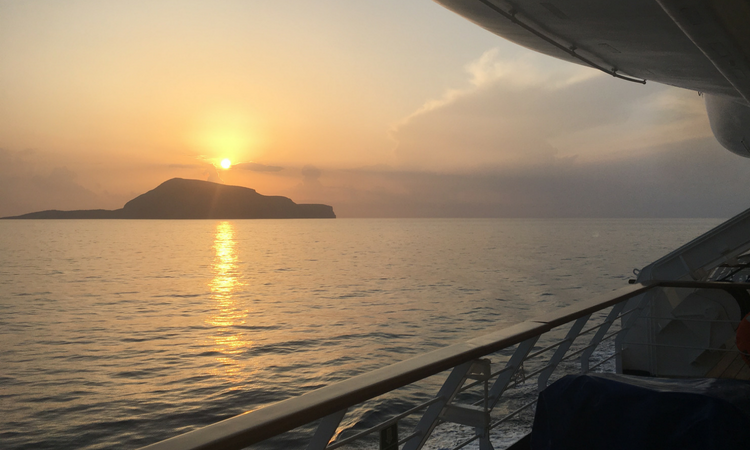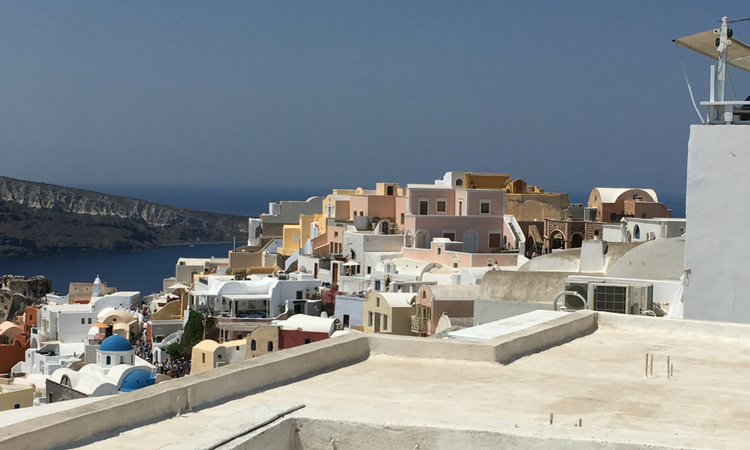On As A Passenger. Off As Cargo.
I just returned from my trip to Greece. As you may remember from a previous post, I went with Dean, an old friend. A few, quick reflections.
Go If You Can. And, For My Money, A Good Touring Company Is Worth It.
We went with Road Scholar, a pun that says a good deal about the sort of people who sign up for the trips this company leads around the world: retired college professors, libriarians, and such like. But there wasn’t a final exam on the vast amount of information that our extremely knowledgeable and friendly Greek guide, Eleni Petroutsou, imparted to us during the course of the week we spent with her bussing around the mainland. And then continued aboard the smallish ship, Aegean Odyssey, cruising from island to lovely island for the following week.

No, the real exam came months earlier: our bank accounts. And it was a tough one. On more than one occasion I heard the old gag, “We’re spending our children’s inheritance.” But, since I estimate that at least 60% of our 30 some Road Scholar participants were retired government workers (Dean estimated more like 90%), they might just as well have said, “We’re spending the inheritance of the children of the taxpayers who are so generously supporting us.” But who would snicker at that?
Your Required Reading.
Well in advance of the trip, the company sent us a hefty list of suggested books on Greece. I ordered most of them. And read most of those. Henry Miller’s The Colossus of Maroussi left me cold. So did Mary Renault’s The King Must Die, which surprised me given its exalted reputation. Of these two books, I followed the sage advice that I heard somewhere not long ago, “There are too many good books to spend time on ones you don’t like.”
By now, you know I’m a sucker for history. A couple of the books I’d recommend would be Modern Greece, What Everyone Needs to Know and Introducing the Ancient Greeks, From Bronze Age Seafarers to Navigators of the Western Mind.
Modern Greece was particularly interesting. Like many others, I suppose, I’d imagined that Greek history ended pretty much ended 2400 years ago with the close of the classical Golden Age and didn’t start again until the financial crisis of 2008. Wrong. Before winning its War of Independence from the Ottomans in 1821, Greece endured 400 years of Ottoman/Turk occupation. While our guide Elani did her best to play things down the middle, there was little question as to where she stood in regards to Greece’s long and glorious, but at times, tormented history.
For those really interested in cramming, here are some of the others: The Parthenon, Athens, The Greeks, An Illustrated History, Greek Mythology, A Traveler’s Guide. (I gave this one a pass also; seemed like a bunch of implausible fairy tales. Although our expert guide made a good case that these apparently anarchic stories often go a long way toward explaining the more obscure aspects of the prehistoric Greek world.)
On my own, I also took the new Kindle my wife gave me for Christmas for a spin, rereading Zorba the Greek (the first time was decades ago). I should have listened to my own better angels and quit long before I reached the bitter end; talk about unbridled nihilism. Why this book is so widely praised is a mystery to me. Well, not really. It must be for many of the same reasons that Hollywood cranks out so many profitable stinkers.
And the worst of it? It didn’t even have the courtesy to lull me to sleep on the excruciatingly painful and interminable flights to and from Zorba land. Airlines! Where they keep making the seats smaller. And the people bigger.
Cruisin’
On the last day of the trip, I was savoring breakfast on the sun drenched fantail of the Odyssey in the port of Piraeus. You know, my usual morning fare: an unlimited selection of eggs, meats, fruits, cereals, cheeses, grilled vegetables, juices, desserts, etc., etc.
Now, does that goofy headline make sense? “The kind of cruise where you get on as a passenger. And get off as cargo.” Remarkably, however, when I fearfully stepped on the scale on my return home, I actually seemed to have lost a bit of weight. Guess that airline food is good for something.
That morning was also a last chance to visit with some of my fellow Scholars. Among them was a woman, Kristen, from Telluride, Colorado. She and I had a tenuous connection through my cousin’s daughter, Denver chef Carrie Baird. Carrie was a near finalist in this year’s Top Chef Colorado show. At least one episode had been filmed in Telluride. Kristen had seen some of the shoot. You heard it here: six degrees must be a reality.
As we lingered over breakfast, a cruise ship about the size of a small-correction, medium-sized city shoe horned it’s way into port and pulled into a slip to our right. The monster towered above our heads and took at least five minutes to lumber past us. Lilliputian by comparison, I don’t doubt that our vessel would have been able to cut neat figure eights in the leviathon’s swimming pool.
And that was the beauty of the Aegean Odyssey. Plenty big enough for all the creature comforts. But small enough that our relatively modest passenger manifest didn’t completely overwhelm the equally smallish, quaint island villages where we made landfall.
And Eleni wasn’t just a smart cookie. She also had sharp enough elbows to make sure that we got into town, saw the antiquities, and did our scholarly thing ahead of the leviathons’ mobs that usually followed so closely on our heels.




